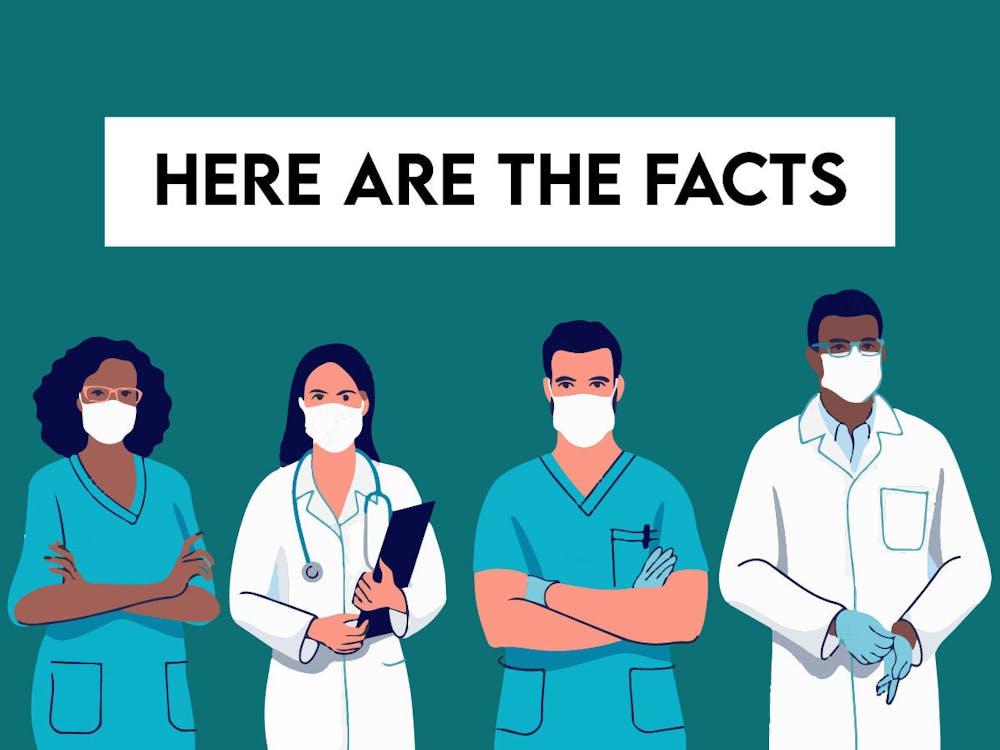As of last week, 95% of Shands COVID-19 patients were unvaccinated. Despite high hospitalization numbers and experts reassuring people that COVID-19 vaccines are safe and effective, some are still skeptical about getting the shot.
Tony Domenech, a retired Gainesville resident and former city commissioner, said he doesn’t care whether people are vaccinated or not. However, he doesn’t support UF Health’s recent vaccine mandate, or any other mandates like it, because they lead people to pressure others to get vaccinated and strain relationships. He also has personal distrust in the government.
“There’s a lot of times [government officials] don’t tell me the truth, so I question the things that they’ve been telling us,” Domenech said.
Despite some skepticism, Domenech got the vaccine in summer because he was high-risk for severe infection. But he still doesn’t trust it, and said it isn’t really a vaccine because it doesn’t prevent COVID-19.
Krissy Copley, a former patient advocate, said her father developed tremors a little while after getting the virus, despite having completed his vaccination shots six months prior.
“So how did he get the COVID?” Copley said. “It doesn’t make sense if they’re all taking precaution.”
But millions have received COVID-19 vaccines under the most intense safety monitoring in U.S. history, Kartik Cherabuddi, associate professor of infectious diseases and UF Health epidemiologist, wrote in an email.
“Health care workers have had close follow-up and scrutiny and have not demonstrated any long-term side effects from the vaccine,” Cherabuddi wrote.
Although he testifies for the effectiveness of the vaccine, Cherabuddi wrote the vaccines don’t completely prevent a positive COVID test. However, vaccines prevent severe complications that could lead to death, as well as limit infection and spread, he added.
“Risk reduction and prevention strategies in medicine target more severe complications and the COVID-19 vaccines are highly effective at preventing those,” he wrote.
Cherabuddi said the spread of misinformation leads people to question the vaccine. The best way to combat myths and change minds has been through having individual conversations with patients, Cherabuddi said. UF Health has group sessions to ensure staff is well informed.
Early on in the pandemic, broad forms of communication informed people, Cherabuddi said. But over time, people narrowed their sources of information. Social media has led to echo chambers where beliefs, regardless of facts, are reinforced by repetition and safe from refutation. When people consume information from these closed spaces, changing their minds through broad communication becomes harder.
Disinformation is intentionally used to deceive others for personal gain, he said. Just 12 people, dubbed the “Disinformation Dozen,” promote 65% of vaccine disinformation on social media, according to an NPR report. Most people who consume this information seek to inform their friends and family without intending to deceive them, distinguishing this type of lie as different from misinformation, Cherabuddi said.
“Because the disinformation campaigns are made so well, it’s hard to distinguish between accurate information and misinformation,” Cherabuddi said.
Platforms like Facebook have helped spread doubt about vaccines, he said.
“The noise of it all plays with your mind,” Cherabuddi said.
UF Health has seen very few severe reactions, no one has died from vaccination and most people have mild symptoms for a day or two, Cherabuddi said. According to The Wall Street Journal, COVID-19 was over five times more common among hospitalized patients who were unvaccinated and had prior infection, compared with those who were fully vaccinated and weren’t previously infected. Only a handful of people with medical conditions have been advised not to get vaccinated.
Claims that booster shots have adverse reactions are also false, he said
“Everyone else has successfully taken the vaccination, even though they have allergies to other medicines or vaccines,” Cherabuddi said.
Cherabuddi said people should talk with their doctors about their concerns.
“If you’re honest with them and engage them, they’re willing to listen in and take action as well,” Cherabuddi said.
Contact J.P. Oprison at joprison@alligator.org. Follow him on Twitter @JOprison.

JP is a fourth-year journalism major with a minor in history. He is currently the health reporter for The Alligator, focusing on how the pandemic is affecting Alachua County and the thousands of students in Gainesville. In his free time, JP likes to exercise at the gym and relax on the beach.






